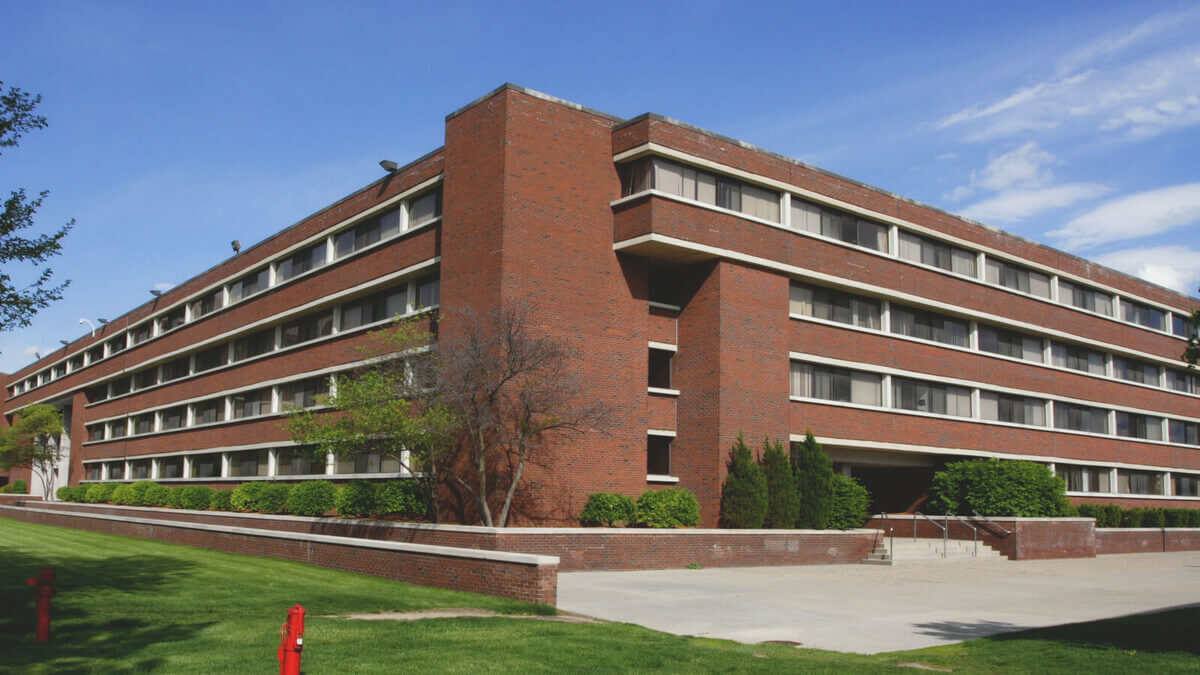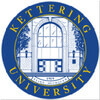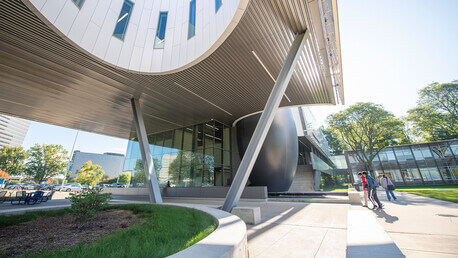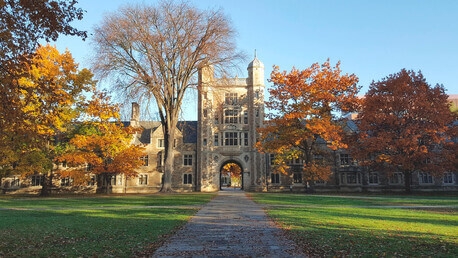Overview



Kettering University
Flint, MI, USA
Private
4 Year
Overview
Originally founded as The School of Automobile Trades, Kettering University is a 4-year private school in eastern Michigan. Kettering awards bachelor’s degrees in 13 academic programs with a STEM-centered focus. In addition to classroom facilities, the university is home to the GM Mobility Research Center and Kettering’s FIRST Robotics Community Center. For students interested in the automotive industry, Kettering participates in the Autodrive Challenge, recruiting a group of students to design and develop an autonomous driving vehicle.
Acceptance Rate:
81%
Average Net Price:
$37,518
Campus Setting:
Small city
Average GPA
3.7
Average ACT Composite
27
Average SAT Composite
1278
Tuition, Cost & Aid
Affordability & Cost
Average Net Price
$37,518
Discover how military service can help you pay for college
Explore Military PathwaysTuition
| In-State Tuition In-state tuition is the tuition charged by institutions to those students who meet the state's or institution's residency requirements. In-district tuition is the tuition charged by the institution to those students residing in the locality in which they attend school and may be a lower rate than in-state tuition if offered by the institution. | $45,380 |
| Out-of-State Tuition Out-of-state tuition is the tuition charged by institutions to those students who do not meet the state’s or institution’s residency requirements. Out-of-district tuition is the tuition charged by the institution to those students not residing in the locality in which they attend school. | $45,380 |
Additional Costs
Room and Board The weighted average for room and board and other expenses is generated as follows:
| $9,500 |
| Books and Supplies | $1100 |
Average Net Price By Family Income
Income
Average Amount
< $30k
$29,102
$30k - $48k
$31,489
$48k - $75k
$36,266
$75k - $110k
$37,577
$110k+
$40,302
Financial Aid: visit page
Financial Aid Email: [email protected]
Aid & Grants
0
100
89%
Need Met
Students Receiving Gift Aid Percent of undergraduate students awarded federal gift aid. Federal gift aid includes any grant or scholarship aid awarded, from the federal government, a state or local government, the institution, and other sources known by the institution. Students Receiving Grants Percent of undergraduate students awarded grant aid. Grant aid includes any grant or scholarship aid awarded, from the federal government, a state or local government, the institution, and other sources known by the institution.
18%
Average Aid Per Year
$24,697
18%
Average Federal Grant Aid Per Year
$2,023
Average Institution Grant Aid Per Year
$21,403
Students receiving state aid Students receiving federal aid
49%
Average State Grant Aid Per Year
$2648
99%
Average Federal Grant Aid Per Year
$2,023
Average Grant & Scholarship By Family Income
Income
Average Amount
< $30k
$33,576
$30k - $48k
$31,764
$48k - $75k
$25,141
$75k - $110k
$24,155
$110k+
$21,654
Total Needs Based Scholarships/Grants Total amount of grant or scholarship aid awarded to all undergraduates from the federal government, state/local government, the institution, and other sources known to the institution.
$19,351,262
Total Non-Need-Based Scholarships/Grants
$10,103,972
Student Loans
Students Borrowing Loans Loans to students - Any monies that must be repaid to the lending institution for which the student is the designated borrower. Includes all Title IV subsidized and unsubsidized loans and all institutionally- and privately-sponsored loans. Does not include PLUS and other loans made directly to parents.
58%
Average Loan Amount Per Year
$12,071
Average Debt at Graduation The median federal debt of undergraduate borrowers who graduated. This figure includes only federal loans; it excludes private student loans and Parent PLUS loans.
$26,834
Median Monthly Loan Payment The median monthly loan payment for student borrowers who completed, if it were repaid over 10 years at a 5.05% interest rate.
$267
Students receiving federal loans
54%
Average Federal Loans Per Year
$5,195
Average Other Loans Per Year
$21,122
Admissions
Key Admissions Stats
Institution Type
Private
- Not for Profit
- Coed
Need Blind
This school does not consider an applicant’s financial situation when deciding admission
Level of Institution
4 Year
Campus Setting
Small city
1823
Students Applied
48%
Transfer Acceptance Rate
22
Transfer Students Admitted
Admissions Requirements
SAT
No
ACT
No
Transcript
Yes
Test Optional
No
SAT Subject Tests
Yes
AP Course Credit
Yes
Dual Enrollment
Yes
Important Deadlines
| Application Type | Application Deadline | Reply Deadline |
|---|---|---|
| Early Action Acceptance is not binding, but student will receive admissions decision earlier. | November 15 | |
| Fall Regular Decision | November 15 |
Applications Accepted
Admitted Student Stats
In-State Students
83%
Out-Of-State Students
12%
13%
Submitting ACT
55%
Submitting SAT
Average ACT Composite: 27
0
36
Average SAT Composite: 1278
0
1600
SAT Percentiles
Math
25th
570
75th
690
Reading
25th
560
75th
680
3.7
Average GPA
Students Enrolled By GPA
3.75+
55%
3.50 - 3.74
21%
3.25 - 3.49
14%
3.00 - 3.24
7%
2.50 - 2.99
3%
Students Enrolled By Class Rank
Top 10%
22
Top 25%
52
Top 50%
86
Admissions Resources
For International Student Services: visit page
For Students with Disabilities: visit page
For Veteran Services: visit page
Academics
Key Academic Stats
Highest Degree Offered
Master's
Total Number of Students
1,769
Total Number of Undergrads
1,422
0
100
10%
Graduate in 4 Years US National: 28%
0
100
67%
Graduate in 6 Years US National: 52%
Student:Faculty Ratio
12:1
US National: 21:1Non Traditional Learning
- Online Classes
- Online Undergrad Degrees
- Summer Sessions
- Combined Institution Double Degree Programs
- Some Programs Requires Co-Op/Internship
Learning Options
- Study Abroad
- Honors Program
Classroom Sizes
2-19 Students
50%
20-39 Students
45%
40-99 Students
3%
Degrees and Majors
MAJORS
20
Majors
| A B M D | |
|---|---|
| BIOLOGICAL AND BIOMEDICAL SCIENCES | |
| BUSINESS, MANAGEMENT, MARKETING, AND RELATED SUPPORT SERVICES | |
| COMPUTER AND INFORMATION SCIENCES AND SUPPORT SERVICES | |
| ENGINEERING | |
| ENGINEERING/ENGINEERING-RELATED TECHNOLOGIES/TECHNICIANS | |
| MATHEMATICS AND STATISTICS | |
| PHYSICAL SCIENCES |
Faculty Overview
Gender
Male
Female
US National: 42%
US National: 48%
Ethnicity
African American
Asian/Pacific Islander
White
Hispanic
Unknown
Campus Life
Key Campus Stats
Student Gender
Male
Female
79%
US National: 44%21%
US National: 56%Residency
In-State Students
83%
Out-Of-State Students
12%
Size of Town
Small city
US States Represented
31
Countries Represented
16
Ethnicity
African American
3%
Asian/Pacific Islander
6%
Hispanic
4%
White
77%
Multiracial
4%
Unknown
2%
Percent of First Generation Students
18%
Student Organizations
53
LGBTQIA Student Resource Groups
Yes
On Campus Women's Center
Yes
Cultural Student Resource Groups
Yes
Housing
0
100
6%
Undergrads Living on Campus
On-campus living required of freshman
Yes
Disability Housing Available
No
0
100
67%
Freshman Living on Campus
Athletics
Divisional Sports Nickname
Bulldog
School Colors
blue and gold
Varsity Athletics Conference Primary
Not applicable
Intramural Sports
7
Sports Club
5
Campus Safety
24-HR security patrol
Yes
Campus emergency phones
Yes
24-HR escort safety rides
Yes
Mobile campus emergency alert
Yes
After Graduation
Post Grad Stats
Average Salary
6 years after graduation
$78,500
Top 5 Cities
Detroit
Grand Rapids
Chicago
Saginaw
Indianapolis
Top 5 Employers
General Motors
Ford Motor Company
FCA Fiat Chrysler Automobiles
Delphi
Kettering University
Top 5 Sectors
Engineering
Operations
Business Development
Information Technology
Sales
Average Debt at Graduation The median federal debt of undergraduate borrowers who graduated. This figure includes only federal loans; it excludes private student loans and Parent PLUS loans.
$26,834
Loan Default Rate
4%
National: 8%
Median Monthly Loan Payment The median monthly loan payment for student borrowers who completed, if it were repaid over 10 years at a 5.05% interest rate.
$267
REVIEWS
Read What Students Are SayingI haven't had a professor I couldn't understand, and classes are small enough that I can ask the professor any questions I have, and they all know me by name.
Zachary from Defiance, OH
This is the best place you could go if you plan to major in engineering. Kettering mixes schooling with working at a real life job so you will be more experienced than the average student at other universities. It's hard work, but it definitely pays off.
Kellie from Cary, IL
Kettering University is an extremely challenging University that is completely based on the co-op program. Kettering is a great school to be challenged in a unique way to provide the best learning environment possible.
Andy from Mount Morris, MI
This is a great school if you are ready to work hard and learn a lot. Most of the teachers I have had had are great, and the ones who were not were in easy classes where you could learn all the material just from reading the book anyway. Classroom size tends to be small, especially in labs, so instructors have more time for you if you need it. Learning tends to be hands-on, which is beneficial to the way most students learn best.
Luke from Belding, MI
This school is definitely challenging. You'll be learning something new every day!
Elysia from Lindenhurst, IL
An intensive Engineering school in Flint, MI that puts students in 3-Month rotations that alternate between school and work. Students take place in this program for 4.5 years, and end up having 2.5 years of work experience as well. A very close community of 2,000 students.
Joseph from Lake Orion, MI
The teachers are extremely helpful and easy to understand. If you put the effort forth and show that you want to learn something, you'll have no problem doing just that.
Jon-Alan from Toledo, OH
Kettering challenges you to be the best that you can be and has a curriculum specifically focused on engineering. You dive right into your engineering classes your freshman year!
Melissa from Stanton, MI
Kettering is the best Co-Op School in America. With hundreds of company links all across the country, and an incredible Common Core-less curriculum, they WILL set you up for success in your future. Just as they will mine.
Samuel from Bellbrook, OH
When it comes to engineering, look no further. The best are made here and the rest can't compare to here.
Justin from Fenton, MI
Similar Colleges
 West Lafayette, IN
West Lafayette, IN Cambridge, MA
Cambridge, MA Cambridge, MA
Cambridge, MA Mount Pleasant, MI
Mount Pleasant, MI Allendale, MI
Allendale, MI Southfield, MI
Southfield, MI Ann Arbor, MI
Ann Arbor, MI East Lansing, MI
East Lansing, MI Houghton, MI
Houghton, MI Rochester Hills, MI
Rochester Hills, MI Detroit, MI
Detroit, MI Kalamazoo, MI
Kalamazoo, MI
Kettering University